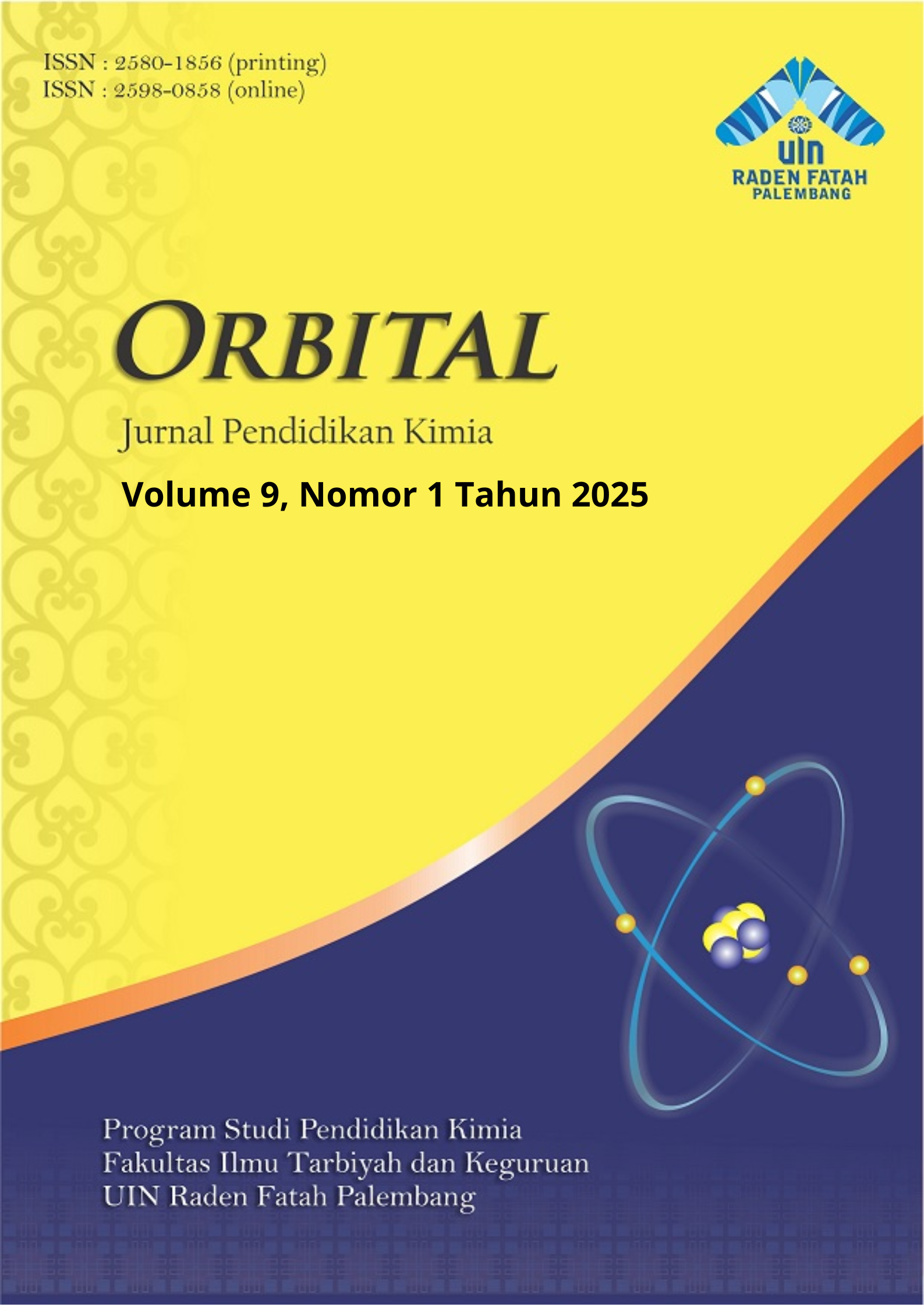The Impact of Integrating Gamification into Cooperative Learning TPS on Students’ Mastery of Heterocyclic Compound Nomenclature
Main Article Content
Abstract
This research project investigates how incorporating gamification into the cooperative learning strategy Think-Pair-Share (TPS) affects students’ understanding of heterocyclic compound nomenclature, which is a difficult and frequently problematic aspect of organic chemistry. A quasi-experimental design was utilized with 60 undergraduate chemistry students in their seventh semester at the University of Zawia. Participants were randomly divided into three groups: traditional instruction (Control), TPS (Ga), and TPS with gamified flashcards (Gb). Quantitative data were obtained via a post-instruction exam and analyzed with one-way ANOVA and Tukey’s HSD. The Gb group attained the highest average score (8.11), significantly surpassing both the Ga (6.40) and Control (5.25) groups (ANOVA, F = 14.72, p < 0.001). These findings were further corroborated by qualitative data collected through interviews and questionnaires, revealing that more than 85% of students in the Gb group reported increased engagement, motivation, and understanding. The study concludes that the combination of gamification and TPS leads to significant improvements in conceptual learning outcomes in chemistry, and it recommends applying this approach more widely in science education.
Article Details

This work is licensed under a Creative Commons Attribution-ShareAlike 4.0 International License.
How to Cite
References
Abubakari, A., Nabie, M. J., Adusei, M. S., & Zuberu, M. B. (2023). The effectiveness of the “Think-Pair-Share” cooperative learning approach in the teaching of mensuration to senior high school students. Journal of Global Research in Education and Social Science, 17(4), 63–74. https://doi.org/10.56557/jogress/2023/v17i58432
Adzanil, P. S., Angelina, Y., & Adzanil, F. N. (2025). Students’ collaborative learning strategy of think-pair-share toward writing skill improvement: a study at smkn 3 payakumbuh vocational high school of fashion department. Journal of Education and Culture, 5(1), 1–10. https://ejournal.indrainstitute.id/index.php/jec/index
Al Abri, J. S., & Al-Mekhlafi, A. M. (2025). Think-Pair-Share: An active learning strategy to enhance EFL learners’ oral communication skills. World Journal of English Language, 15(3), 165–175. https://doi.org/10.5430/wjel.v15n3p165
Alouzi, K. M. (2024). Assessment of requirements for the creation of course materials for English as a second language for students majoring in subjects other than English. Majapahit Journal of English Studies, 2(1), 19–34. https://doi.org/10.69965/mjes.v2i1.105
Annisa Mutma’inna, Mahartika, I., Alfiah, Pangoloan Soleman Ritonga, & Nofri Yuhelman. (2024). Engaging Chemistry Learning: Combining Uno Flashcards And Assemblr Edu for Nomenclature Of Compound Material. Orbital: Jurnal Pendidikan Kimia, 8(2), 210–223. https://doi.org/10.19109/ojpk.v8i2.24426
Baroud, N. (2024). A systematic comparison of students’ attitudes toward practical work in chemistry department, Faculty of Education, Zawia University. International Journal of Chemistry Education Research, 8(2), 137–143. https://doi.org/10.20885/ijcer.vol8.iss2.art7
Baroud, Najah, & Aljarmi, A. (2025). Enhancing students understanding of hybridization in organic compounds through a flipped classroom approach combined with game-based learning. Jurnal Pijar Mipa, 20(3), 387–393. https://doi.org/10.29303/jpm.v20i3.8725
Baroud, Najah, Alouzi, K., Elfzzani, Z., Ayad, N., & Albshkar, H. (2024). Educators’ Perspectives on Using (AI) As A Content Creation Tool in Libyan Higher Education: A Case Study of The University of Zawia. JERIT: Journal of Educational Research and Innovation Technology, 1(2 SE-Articles), 61–70. https://doi.org/10.34125/jerit.v1i2.12
Busthomi, Y., Zainuddin, Z., & Masuwd, M. (2024). E-magazine trial design with a social emotional learning approach using kvisoft flipbook software in madrasah. Al-Insyiroh: Jurnal Studi Keislaman, 10(2), 364–384. https://doi.org/10.35309/alinsyiroh.v10i2.306
Byusa, E., Kampire, E., & Mwesigye, A. R. (2022). Game-based learning approach on students’ motivation and understanding of chemistry concepts: A systematic review of literature. Heliyon, 8(5), e09541. https://doi.org/10.1016/j.heliyon.2022.e09541
Firdaus, R., Sunarno, Fahmi, A., Fadhillah, & Masuwd, M. (2025). Improving the quality of education through quality of service and education costs. Nidhomul Haq: Jurnal Manajemen Pendidikan Islam, 9(3), 756–768. https://doi.org/10.31538/ndhq.v9i3.63
Lutfi, A., Aftinia, F., & Eka Permani, B. (2023). Gamification: Game as a medium for learning chemistry to motivate and increase retention of student learning outcomes. Journal of Technology and Science Education, 13(1), 193–207. https://doi.org/10.3926/jotse.1842
Nwankwo, M. C., & Nnamani, M. K. (2025). Effect of think-pair-share instructional strategy on the academic achievement of senior secondary school students in mathematics in Onitsha Education Zone, Anambra State. Unizik Journal of Educational Research and Policy Studies, 4(1), 246–257.
Öztürk, B. (2023). The effect of cooperative learning models on learning outcomes: a second-order meta-analysis. Educational Policy Analysis and Strategic Research, 18(3), 273–296. https://doi.org/10.29329/epasr.2023.600.13
Rudolf, E. (2022). With Gamification To Collaborative Learning in Chemistry Lessons. Gamtamokslinis Ugdymas / Natural Science Education, 19(2), 82–96. https://doi.org/10.48127/gu-nse/22.19.82
Satari, C., Wiji, W., Widhiyanti, T., & Mulyani, S. (2024). Systematic Literature Review: A Fun Organic Chemistry Learning Experience with Educational Games. Jurnal Penelitian Pendidikan IPA, 10(7 SE-Review), 377–487. https://doi.org/10.29303/jppipa.v10i7.6855
Setyaningrum, V. A., Alifta, Z., Masuwd, M., Khakim, A. M. N., & Putri, A. A. (2024). Flash card media to improve qur’an literacy at masjid jami’ nurul jannah grobogan in the era of posth truth. Jurnal Progress: Wahana Kreativitas Dan Intelektualitas, 12(1), 39–56. https://doi.org/10.31942/pgrs.v12i1.10932
Silva, H., Lopes, J., Dominguez, C., & Morais, E. (2022). Think-Pair-Share and Roundtable: Two Cooperative Learning Structures to Enhance Critical Thinking Skills of 4th Graders. International Electronic Journal of Elementary Education, 15(1), 11–21. https://www.iejee.com/index.php/IEJEE/article/view/1853
Simbolon, T. N. (2025). Exploring Non-Digital Gamification in English Education : Insights from a Middle School Study. Journal of English Language and Education, 10(1), 443–455.
Tegon, R. (2024). Systematic review on the impact of gamification in education: Insights from early 2024. Academia.Edu. Academia.edu.
Wahyudi, W. E., & Masuwd, M. A. (2024). Fostering inclusivity: fitting learning methods with the needs of deaf students at slb ma’arif nu lamongan. Didaktika Religia, 12(1), 34–50. https://doi.org/10.30762/didaktika.v12i1.3455
Xodabande, I., Iravi, Y., Mansouri, B., & Matinparsa, H. (2022). Teaching Academic Words With Digital Flashcards: Investigating the Effectiveness of Mobile-Assisted Vocabulary Learning for University Students. Frontiers in Psychology, 893821. https://doi.org/10.3389/fpsyg.2022.893821

